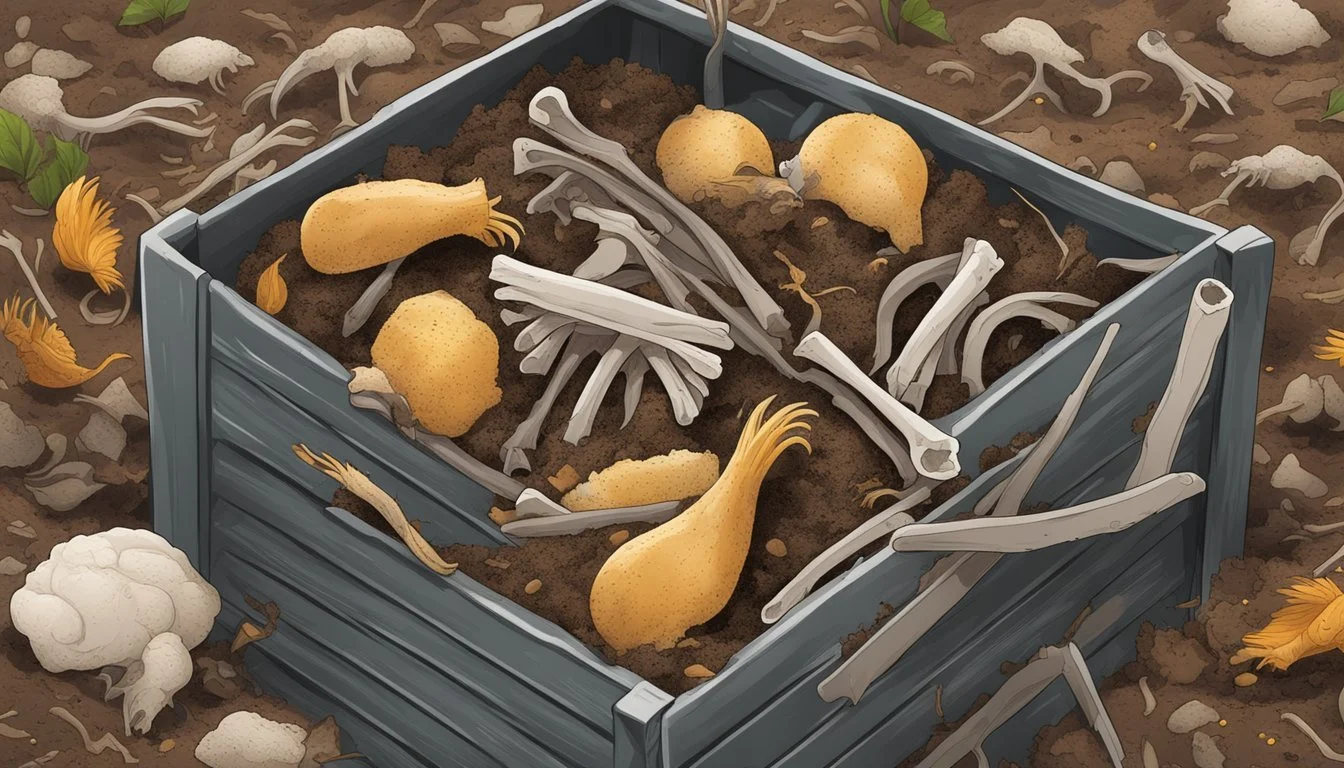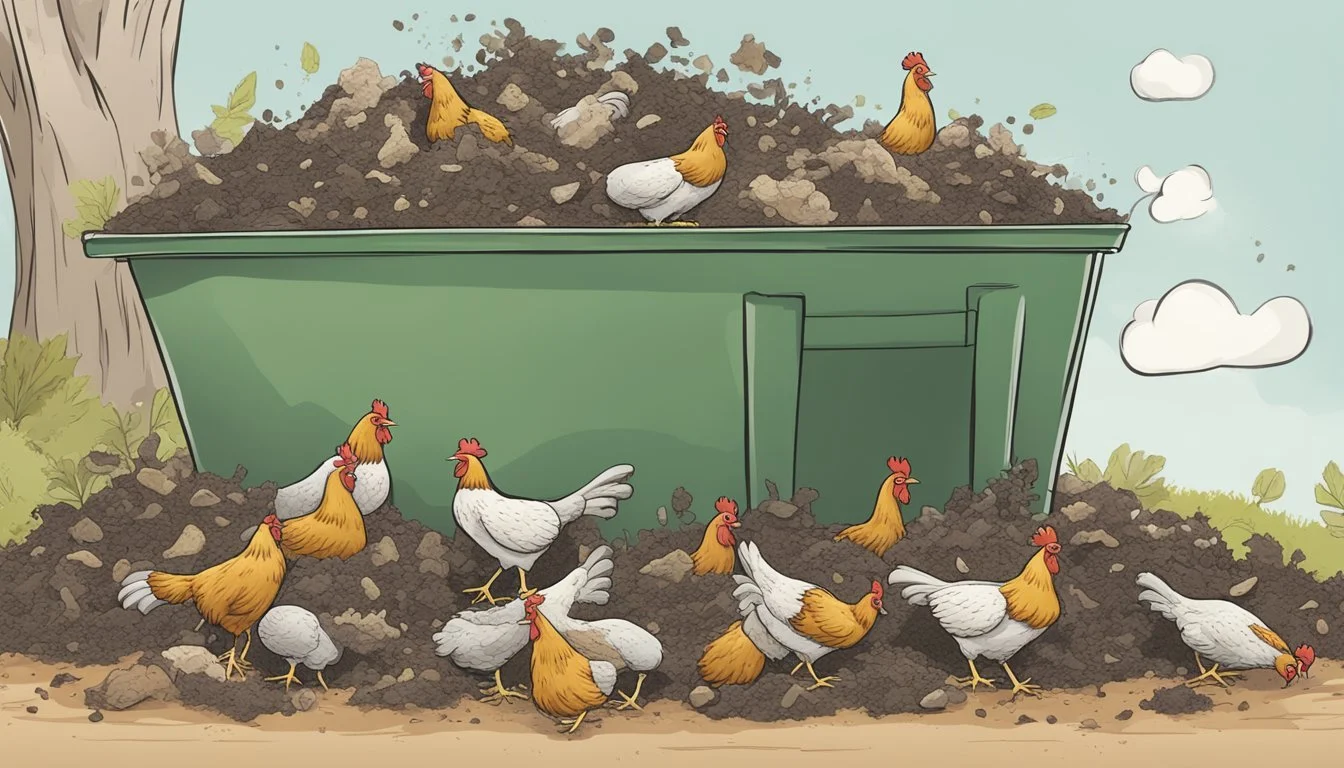Can You Compost Chicken Bones?
Understanding Biodegradation in Home Composting
Composting is a method of recycling organic waste into valuable fertilizer for the garden, supporting a more sustainable lifestyle. Among the plethora of compostable kitchen scraps, chicken (how long does chicken last?) bones are often the subject of debate. While they are indeed compostable, the process for chicken bones differs significantly from that of vegetable peels or coffee grounds. Success lies in understanding the correct techniques to expedite their breakdown and prevent potential issues associated with composting animal products.
Chicken bones add a rich source of calcium and other minerals to compost, which, when fully decomposed, greatly benefit garden soil. However, their dense and durable structure means that bones take longer to break down compared to softer organic materials. To address this, chicken bones require thorough preparation, including breaking them down into smaller pieces and ensuring they are heated sufficiently to eliminate harmful pathogens and deter unwanted pests.
Due to the challenges posed by their composition, a specialized composting approach such as hot composting or the Bokashi method is recommended for chicken bones. These methods provide the conditions necessary for the bones to decompose properly without risking the introduction of diseases or attracting scavengers. With the right practices in place, composting chicken bones can be a safe and effective way to contribute to a nutrient-rich garden soil, closing the loop on food waste.
Basics of Composting
Composting is a methodical process that transforms organic waste into valuable fertilizer, enriching soil and reducing landfill waste. It hinges on balancing key factors to promote efficient decomposition.
Defining Compost and its Purpose
Compost is a nutrient-rich material resulting from the controlled biological decomposition of organic materials. It serves to add vital nutrients back into the soil, fostering plant growth and enhancing soil structure.
The Role of Chicken Bones in Composting
Chicken bones, rich in calcium and phosphorus, can contribute to a more balanced nutrient profile in compost. However, their slow decomposition rate and potential to attract pests make them challenging to compost properly.
Compost Pile Essentials
An effective compost pile requires a balance of carbon (browns like leaves and paper) and nitrogen (greens like vegetable scraps and grass clippings), proper moisture, and sufficient aeration. The ideal carbon to nitrogen ratio is typically around 30:1.
Understanding Decomposition
Decomposition within a compost pile is driven by microorganisms that break down organic material. The rate of decomposition depends on factors such as temperature, composition of the compost materials, and the presence of oxygen. Proper balance and maintenance lead to successful decomposition.
Types of Composting Methods
Hot composting: Requires active maintenance and can reach temperatures up to 140-160°F, accelerating decomposition.
Cold composting: Less labor-intensive but takes longer, typically several months to years, for materials to break down.
Bokashi composting: A method involving an anaerobic process that can include meat and bones.
Worm bin: Utilizes worms to break down food scraps and paper, though typically not appropriate for including chicken bones.
Preparation of Chicken Bones for Composting
Composting chicken bones requires specific preparation to ensure efficient decomposition and to prevent potential issues such as odor and pest attraction. Following the recommended preparation methods can help create a nutrient-rich compost suitable for gardening.
Differences Between Cooked and Raw Bones
Cooked chicken bones are generally safer to compost than raw bones, as cooking can eliminate disease-causing pathogens. Raw bones also have a higher risk of attracting pests due to lingering meat and fat. When composting cooked bones, they should still be dry and brittle to hasten the breakdown process.
Grinding Chicken Bones
Grinding chicken bones into small pieces is crucial as it increases the surface area available for microbial action, speeding up decomposition. Bones can be ground using a garden shredder or a blender specifically for this purpose. The resulting bone meal is easier for microbes to process and integrate into the compost.
Pre-Composting Treatment Methods
Pre-composting treatments such as bokashi bucket composting can be beneficial for chicken bones. In a bokashi system, bones are pre-digested by effective microbes, which reduces odors and the likelihood of attracting pests. Lomi dryers are another appliance that can be used to dry and crush bones into a powdered form, making them ready for composting or use as a bone meal directly in the garden.
Composting Process Involving Chicken Bones
The incorporation of chicken bones into compost is viable but demands specific techniques to manage decomposition speed and health safety concerns. The process can be adjusted to work within various composting methods, each differing in maintenance and speed.
Hot Composting Approach
Hot composting is an accelerated method that involves maintaining a compost heap's temperature between 130°F and 160°F. This technique is effective at breaking down chicken bones more rapidly due to the high temperatures, which expedite the decomposition process while also helping to kill off potential pathogens. It requires a balanced mix of green materials (rich in nitrogen such as vegetable scraps) and brown materials (rich in carbon such as dry leaves) to maintain the necessary heat levels.
Materials: 50/50 of greens (nitrogen) and browns (carbon)
Temperature: Between 130°F - 160°F
Cold Composting Method
Cold composting is a less maintenance-intensive method, but it takes significantly longer to decompose chicken bones. The compost bin or heap is left at ambient temperatures, and bones are broken down by the natural activity of microorganisms over time. This approach might attract pests and could have issues with odors if not managed properly.
Temperature: Ambient
Timeframe: Months to years for complete decomposition
Bokashi Composting Option
Bokashi composting is an anaerobic process that utilizes a special bokashi bran with effective microorganisms to ferment organic waste, including chicken bones, in a bokashi bin. This method can handle bones, but they should ideally be pre-broken to smaller pieces for more efficient breakdown.
Bin type: Airtight Bokashi bin
Additive: Bokashi bran
Vermicomposting Considerations
Vermicomposting involves the use of worms within a worm bin to break down organic waste. However, chicken bones are typically not suitable for vermicomposting, as they don't break down in the timeframe suitable for a worm bin environment. Instead, they may be better processed through hot or bokashi composting before potentially being added to a worm bin.
Bin type: Worm bin
Materials: Avoid adding chicken bones directly
Benefits of Including Chicken Bones in Compost
Incorporating chicken bones into compost adds crucial nutrients to the resulting compost while effectively reducing kitchen waste. When processed correctly, these bones offer multiple advantages for soil enrichment and environmental sustainability.
Nutrient Additions to Soil
Chicken bones enrich soil with essential nutrients such as calcium, phosphorus, and nitrogen. Through the composting process, bones decompose to release these minerals:
Calcium: Vital for cell growth in plants, enhancing overall health and stability.
Phosphorus: Contributes to root development and the creation of DNA, vital for plant vitality.
Nitrogen: An important component of chlorophyll, which is integral to photosynthesis.
Waste Reduction and Environmental Impact
Composting bones reduces the volume of food waste that would otherwise end up in landfills. It minimizes methane emissions, as organic matter in landfills often decomposes anaerobically (without oxygen), releasing this potent greenhouse gas.
Landfills: Diminished waste to landfills contributes to less environmental pollution.
Waste Reduction: Composting turns waste into a resource, benefiting ecological cycles.
Improvement to Plant Growth
Nutrient-rich compost from chicken bones fosters healthier plant growth. The addition of this enriched compost to soil bolsters the presence of beneficial nutrients, creating a robust environment in which plants can thrive:
Improved Soil Health: Compost aids in soil structure, moisture retention, and microbial balance.
Plant Growth: Nutrient-rich soil resulting from compost facilitates sturdier and more productive plants.
Potential Challenges and Solutions
Composting chicken bones can be beneficial for soil enrichment, but it may introduce some challenges such as attracting pests and managing unpleasant odors. Employing the right strategies can help overcome these issues effectively.
Attracting Pests and Rodents
The addition of chicken bones to compost piles can attract pests and rodents seeking food. To minimize this risk:
Enclosure: Use a compost bin with a secure lid and fine mesh wiring to deter entry.
Layering: Bury bones deep within the compost under green waste (like vegetable peelings) and brown materials (such as leaves or straw) to mask the scent.
Managing Odor and Pathogens
Odor and pathogens from decomposing bones can lead to contamination. Addressing this involves:
Aeration: Regular turning of the pile ensures proper oxygen distribution, discouraging anaerobic bacteria, which cause foul odors.
Temperature: Maintaining a hot composting process kills harmful bacteria, reducing the risk of disease and contamination.
Balancing Compost Composition
For chicken bones to decompose efficiently, the compost pile must have a balanced composition. Implement these practices:
Ratio: Consistently manage the ratio of green (nitrogen-rich) to brown (carbon-rich) materials in the compost.
Additives: Incorporate coffee grounds or kitchen scraps to increase nitrogen levels and hasten decomposition.
Bone Meal: If decomposition is slow, consider processing bones into bone meal fertilizer as an alternative to adding raw bones directly to the pile.
Frequently Asked Questions About Chicken Bones Compost
When considering chicken bones for composting, it's important to recognize that while they are compostable, they decompose slowly and have specific benefits and considerations for soil health.
Can Chicken Bones Be Safely Composted?
Chicken bones can be composted safely if they are properly prepared and managed within the compost pile. To mitigate the risk of disease and pest attraction, it's advisable to cook and then break the bones into smaller pieces before adding them to your compost. It's crucial to maintain a balanced compost mix to ensure a healthy decomposition process.
How Long Does It Take for Chicken Bones to Decompose?
The decomposition rate of chicken bones in compost is slower than that of other organic matter. Typically, chicken bones can take anywhere from 60 days to several months or years to decompose, depending on conditions like temperature, composting method, and whether the bones have been broken down into smaller pieces.
Are Chicken Bones Good for the Soil?
Chicken bones are rich in organic phosphate and other minerals essential for soil fertility. As they decompose, they release these nutrients, contributing to soil enrichment. Bones consist of calcium phosphate and collagen fibers; thus, their decomposition not only enhances soil structure but also provides calcium, an essential element for plant growth.
Conclusion
In this conclusion, the focus is on the essence of composting chicken bones, affirming its feasibility and providing a succinct synthesis of the process.
Summary of Composting Chicken Bones
Composting chicken bones is possible and can add value to compost as a source of minerals like calcium. However, it should be noted that the process takes longer than composting other organic materials. Bones require special attention to break down properly in a compost heap. They should be broken into smaller pieces to accelerate decomposition and to avoid attracting pests. Although chicken bones decompose slower than other compost materials, with the right conditions, such as maintaining high temperatures in the compost pile, they will eventually break down and enrich the soil with nutrients.





